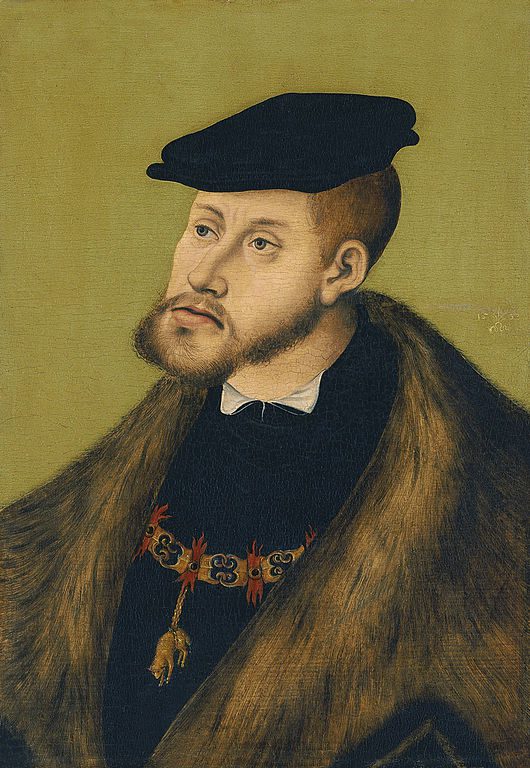
(2-8-06; expanded on 9-26-17)
***
Philip Melanchthon’s words will be in blue.
*****
Concerning the Diet of Speyer (1529) [called “Spires” below], and Melanchthon’s relationship to it, historian of Germany Johannes Janssen wrote:
On April 19, in full assembly of the Diet, the imperial commisionares announced that . . . they now, in their own and the Emperor’s name, accepted the decision of the majority of the notables on the religious question . . . This resolution of the Diet granted to the Lutheran States the right of maintaining the new religion and church service within their domains, and the only stipulation in favor of the Catholics . . . was that they should be treated with tolerance. ‘The articles of the Imperial Recess,’ said Melanchthon, ‘do not press hardly on us. On the contrary, they afford us ample protection.’ . . . But it was by intolerance alone that the Lutheran towns and princes had been able to establish their new state religion . . . and by intolerance they were determined to maintain it. They protested against the terms of the recess which enjoined tolerance on them as a duty, and from their protest they received the name of Protestants . . . The princes declared that they could not give their consent to ‘presumptuous transactions . . . which were opposed to God and God’s Holy Word’ . . . In a private letter of April 21 Melanchthon called this protest ‘a terrible business . . . we should not stand in any danger,’ he went on to say, ‘if our party were more accommodating, and behaved more reasonably . . .’ (History of the German People From the Close of the Middle Ages, 16 volumes, translated by A. M. Christie, St. Louis: B. Herder, 1910 [originally 1891]; Vol. V, 209-211; my bolding added)
The ‘protesting’ princes declared themselves altogether unwilling to tolerate the Catholic form of worship within their secular jurisdiction . . . Fourteen towns . . . amongst which were several of the Zwinglian persuasion, joined in the protest of the princes . . . It is from the Diet of Spires that the actual split of the German nation dates. Melanchthon foresaw clearly and with much alarm what would be the consequences . . . of the establishment of a ‘Protestant’ League.
‘I was so greatly alarmed,’ he wrote to a friend after his return from Spires, ‘that for the first few days I felt utterly annihilated . . . This is a tremendous business and fraught with great danger; I tremble lest from these beginnings, there should follow a convulsion of the Empire; and it is not the Empire alone that is in danger, but religion as well.’ (Janssen, ibid., V, 216-217, 219-220)
Luther also opposed the new Protestant League, according to Janssen [V, 220-221], who cites a letter to the Elector of Saxony on 22 May 1529. He did so on two grounds: he thought that it would incite Catholics to form a counter-league and possibly lead to war [Swiss Catholics did just that before the month was out], and he didn’t like Zwinglians also being in the League; i.e., those “who are fighting against God and the Sacrament as the most inveterate enemies of the Divine Word . . . by allying ourselves with them we are taking all their ungodliness on our own shoulders”.
Perhaps Luther had a certain point (to some degree) about the Zwinglians. On June 8, Zwingli’s Zurich declared war on five Swiss Catholic cantons, with the “reformer” himself taking part in the military actions which eventually got him killed (on 11 October 1531). Luther saw his death as a judgment and vindication of his opinion that Zwingli was damned and no Christian at all. Ironically, Zurich then decided to compensate the Catholics for stolen Church property, and embraced toleration of the Catholic faith.
Catholics repeatedly offered religious tolerance to the Protestant princes in similar councils, such as Augsburg (1530), Regensburg (1541), and Poissy (1561), while the Protestants consistently refused to reciprocate (or to return stolen church property). But does one Protestant (or Catholic) in 5000 (maybe 50,000) know this, or are they aware of the fact that the very word Protestant is derived not from mere protest against Catholicism, but from protest of toleration of Catholic worship, even while Catholics at the same time were quite willing to tolerate the innovative Protestant worship? It’s amazing how the truth of history here is as opposite from the stereotype and myth (especially among the tiny, fringe anti-Catholic wing of Protestantism) as it can be.
***
Michael Tilden wrote on my Facebook page:
I’m sorry Dave, but your characterization of the decrees of the Diet of Speyer is wrong. The Diet of Speyer ruled that Lutherans would have tolerate Catholicism, [but] this isn’t what the Lutherans objected to. What they objected to was the fact that the decrees did not similarly require that Catholics tolerate Lutheranism. What they objected to was the imbalance, that Lutheran were required to grant tolerance, but Catholics were not. They believed that it was only fair that tolerance be mutual, and I think that was a fair point.
Moreover, the 1529 decree was a reversal of a decree from 1526, which said that Catholics would be required to tolerate Lutheranism. But, after significant victories in battle against France by Charles V, the newly emboldened Catholics decided decrees of religious tolerance that had been granted only 3 years earlier.
So, the decrees of 1529 represented a denial of rights to Lutherans that had previously been granted.
And that is why the Lutherans protested. They didn’t protest the fact that Lutherans were required to grant tolerance to Catholics. That is a mischaracterization.
The Catholic Encyclopedia (“Protestantism”) states:
The Diet of the Holy Roman Empire, assembled at Speyer in April, 1529, resolved that, according to a decree promulgated at the Diet of Worms (1524), communities in which the new religion was so far established that it could not without great trouble be altered should be free to maintain it, but until the meeting of the council they should introduce no further innovations in religion, and should not forbid the Mass, or hinder Catholics from assisting thereat.
Against this decree, and especially against the last article, the adherents of the new Evangel — the Elector Frederick of Saxony, the Landgrave of Hesse, the Margrave Albert of Brandenburg, the Dukes of Lüneburg, the Prince of Anhalt, together with the deputies of fourteen of the free and imperial cities — entered a solemn protest as unjust and impious. The meaning of the protest was that the dissentients did not intend to tolerate Catholicism within their borders. On that account they were called Protestants.
Historian Warren H. Carroll, in his book, The Cleaving of Christendom (Front Royal, Virginia: Christendom Press, 2000, p. 96) wrote:
[Emperor] Charles V . . . [declared that] there should be no further religious changes and no violent measures or compulsion in religious matters, but that those denying the Real Presence in the Eucharist (Zwinglians and Anabaptists) should be suppressed everywhere. On his imperial authority he formally annulled the article in the final decree of the First Diet of Speyer in 1526 stating that each ruler could act on religious matters as he saw fit. Though that continued to be demanded by the Lutherans at the Diet, on April 19 the majority reaffirmed the Edict of Worms, except for areas “where the new teaching had been introduced and could not be abolished without notable revolt, trouble and danger” and declared that even in such areas, Mass was not to be interfered with.
. . . The next day [April 20] they [the Protestants] issued an expanded form of the Protest which explicitly declared that the Mass would not be said in the domains and cities of the signatories and stated their outright rejection of the Edict of Worms of 1521.
Thus, the [non-Zwinglian / non-Anabaptist] Protestants were basically allowed to practice their religion, on the condition that the Mass was also allowed in their territories.
The Protestants then refused to allow that. Therefore, my original point stands: they were protesting in favor of the right to suppress the Mass and religious freedom for Catholics in their territories.
I noted above how even Philip Melanchthon thought the terms were quite reasonable and fair, and disliked the protest.
The Protestants, having existed a mere 12 years at that point, were not exactly in a position to negotiate as supposed equals. They were rebels against 1500-year precedent and existing religious belief and practice. I think it was extraordinary that they were granted what they were granted.
All the Emperor required was freedom of the Mass in the new Lutheran territories. Protestants consistently refused to allow that, here and in other similar councils and diets.
It’s a difference of principle between the two parties. Catholics did not believe in the absolute primacy of conscience for each individual person. Yet they were willing — for the sake of peace — to grant to the Lutherans freedom of worship in their own territories (if not in Catholic ones: which we would expect).
Protestants did believe in the absolute primacy of conscience for each individual person (after all, this was the whole point of the glorified scene of Luther at Worms in 1521), yet they contradicted this in forbidding the continuance of the Mass in their own territories (which is precisely an exercise of what non-Protestant Christians believed in good conscience).
The Lutherans at the Diet of Speyer in 1529 were more tolerant of the Zwinglians, who denied the Real Presence in the Eucharist, than of Catholics (and formally made common cause with them). But Luther himself said that he’d more readily believe in transubstantiation than a symbolic Eucharist, and regarded Zwingli and his party as damned, and not Christian.
***
Photo credit: Portrait of Emperor Charles V (1533), by Lucas Cranach the Elder (1472-1553) [public domain / Wikimedia Commons]
***













